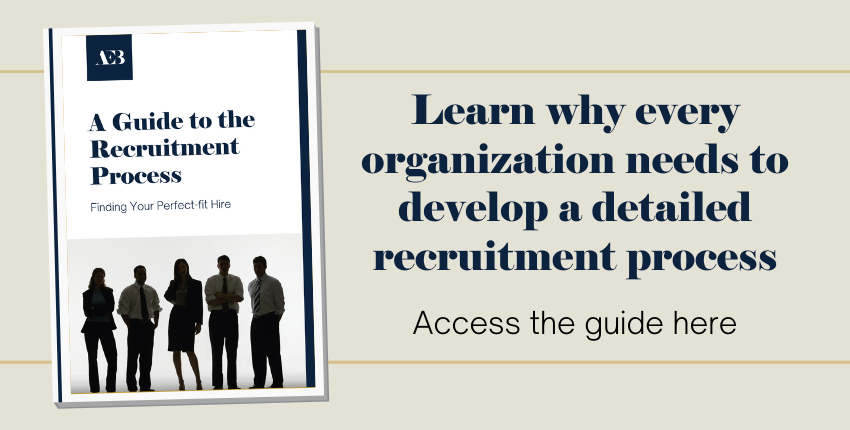Recruiters and hiring managers share a common goal: finding great candidates. However, there is a sense of urgency when working with search firms. We are often asked how long will it take for our search services to find the perfect candidate. To be completely candid, that’s a hard question to answer.
According to the Society of Human Resource Management’s (SHRM) 2017 Talent Acquisition Benchmarking Report, the average time to fill was 36 days. Just five years later, the average has increased to 42 days. Investigating your industry’s average time to fill could be a good starting benchmark, however, the duration of search services can depend on several various factors.
We often answer “how long” questions by helping our clients to better understand our process. When you have an understanding of how a search firm anticipates, manages, and mitigates factors that impact the time to fill — even those that may be outside of their immediate control — you have a better understanding of how long the entire process will take.
A Quality Search Process
Before we dive into the factors that impact the duration of a search, let’s first take a look at the various elements that make for a quality search process.
Dedicated Resources
It’s hard to avoid obstacles or mishaps in the search process if you aren’t paying close attention to the task at hand. Can you be confident that your recruiter is focused on the searches you hired them to fill or are you just part of a crowd? If a recruiter is sourcing potential candidates for any number of possible clients, it would be hard to know how focused they are on the specific needs of your company compared to the specific needs of your competitors. A quality search process starts with resources dedicated to your organization and hiring needs.
Defined Criteria
Before beginning any search services, your search firm should review and define all aspects of what a perfect-fit new hire will look like for you. This means identifying qualifications, acquired skills and industry knowledge, performance-based hiring measures, and even personality traits that your successful employees possess. Dive deep into this and think beyond the basic years of experience or licensing credentials. What talent and specialized knowledge do your top performers possess? What personality traits will add to or improve your company culture? Establishing clear criteria upfront avoids wasted time later with candidates that are an unlikely match.
Intentional Search Strategy
Your next perfect-fit hire may not be actively searching for a new role at the moment. Quality search services will include a strategy for not only qualifying active candidates but also a plan for uncovering previously hidden talent. Many times that ideal candidate isn’t openly sharing their desire or need for a change in their career, or they may not even be looking at the moment. Talented recruiters are experts in finding and qualifying passive candidates.
Candidate Selection
What is the selection process for the search firm you are considering? Not all search services perform the same level of candidate vetting and you should be wary of recruiters who simply pass resumes your way with only surface-level knowledge of what you need in a candidate. Your recruiter should be continually evaluating possible candidates at every stage of the process. And they should always be measured against the criteria you defined before the search began.
What Will Impact Search Duration
In an ideal world, you would be able to post a stellar job listing and resumes from highly qualified candidates would flood your inbox in a timely manner. Unfortunately, we aren’t living in that ideal world. There are several factors that can impact the duration of search services — here are seven factors that we’ve seen most often affecting time to fill.
The Search Process
Think, for a moment, about why you are choosing to enlist the services of a search firm in the first place. Anyone can create a job listing and post it on any number of online platforms. It’s free and relatively simple. Beyond wanting to attract the best possible talent, the next most common reason businesses use search services is to save time. But this doesn’t mean that the process itself doesn’t require time to accomplish.
A search process that is well-planned, focused on your specific needs, clearly defined, and intentional in its approach requires a degree of time. And a reputable search firm won’t simply place your opening on multiple job boards or blindly hand you a stack of resumes. They will do their due diligence to provide you with every bit of the services you are paying for.
The Specific Job Role
The role and its hierarchical position within your organization can have a direct impact on the size of the qualified candidate pool. A smaller pool of qualified candidates doesn’t mean there are fewer people to talk to and qualify. Simply that a bit more work and time must be invested by your recruitment search firm to source potential candidates and determine whether they qualify against predefined criteria. Senior and executive search services can take longer than other roles because they often include more rounds of interviews, added screening assessments, and more details to be negotiated.
Current Job Market
Economic and environmental trends and circumstances can sway the job market in either direction, which can have a significant impact on search services. Employment needs can also vary across the country, and from one industry to another. In a tighter job market where hiring levels have slowed, the length of time to source, qualify, and hire candidates increases due to a tiger focus on desired criteria, despite an increase in candidate volume.
Skill Set Requirements
Every search is unique, even when it’s a similar position for a similar company your recruiter has assisted in the past. Some positions have a more narrowly defined skill set requirement than others. While there are some variables, we found that the more niche the position is, the more time you should expect to fill it. It can also take considerable time to find a candidate that has both the core capabilities and technical competencies needed to qualify them as a perfect-fit hire.
The other way that a required skill set can impact the time to fill is if there is a growing skills gap. Some roles that have been increasingly prone to this challenge have been engineers, veterinarians, experienced insurance professionals, and many skilled trade professions.
Company Culture and Reputation
Candidates today understand that an interview is very much a two-way conversation building toward a mutually beneficial working relationship. That means they have expectations of the recruitment process and will be evaluating and qualifying your organization as much as you are evaluating and qualifying them. What is the internal culture and reputation of your company?
An organization known for high levels of turnover, employee dissatisfaction, or other internal challenges may require additional time and effort for its search services to overcome. While many culture and reputation challenges can be changed, this process also requires time and attention to detail.
Compensation and Benefits Package
Another factor that can have a considerable impact on the duration of the search is your compensation and benefits package. Is it competitive enough to attract new talent to your organization? Does it go beyond salary to include healthcare, vacation policies, flexibility, and more? Compensation and benefits packages don’t just entail paying at the top end of a given salary range, as a bottom-end package, especially for executive positions or those with specific skill set requirements, can result in lengthy delays if qualified candidates reject your opportunity.
Internal Hiring Process
Just as recruitment search services need to have proven strategies and selection processes, your organization needs the same. Once your search firm shares candidate information with you, what are your next steps? How many interviews will your team need? How quickly will your hiring managers respond and act to schedule interviews? Companies without a clear process end up formatting the process in real-time, meaning multiple delays, changes, and inconsistencies.
Reducing the Length of Search Services
Given all the factors that can impact the length of search services, at this point you may we wondering what can be done to reduce this? While there are many steps recruiters can take to counteract the hurdles of filling a position, there are also steps that hiring companies can take as well. When working with a search firm, it should feel like a partnership where both the hiring company and the firm are collaborating to find a perfect-fit hire. Here are three recommendations on how a hiring company can help to reduce the length of search services.
Participate in the Process
There is a level of offloading that is possible when outsourcing your hiring process to a search firm. But despite being able to delegate a large portion of the process and responsibilities, you shouldn’t completely walk away. Your participation at the start of search services, and the very end, is critical to avoid delays.
In the beginning, your input is vital to establishing clear expectations and the flow of information. Once sourced candidates are shared for you to meet and qualify, your participation is again essential to ensure the preset process is followed. Remember, a recruiter should be an extension of your team to assist with expertise in the hiring process. They should be a dedicated partner in the process, but you still know your company best and need to be aware of progress being made on your behalf.
Be Realistic With Criteria
When working with a search firm or even evaluating the length of search services, take time to review your candidate criteria and consider whether or not you’ve set realistic expectations. Is your education requirement essential to the role or could experience in the industry equally validate a candidate’s knowledge? As many companies increase flexible work-from-home and remote options, is having a candidate in your local zip code still necessary? By taking stock of the criteria you have in place, you may find opportunities that can help to broaden and diversify your candidate pool, which may help in reducing the time to fill.
Remain Responsive
For a candidate who has scheduled interviews, provided proof of work performance, taken profile assessments, and shared references, delays in feedback at any point of the process are the last thing either of you need (or want). Candidates have expectations in the recruitment process, and if those expectations are not met you could face delays in your search.
Establish with your recruiter the amount of time you have to respond with feedback for each step so you understand what is realistic and expected. And determine when and how much communication, feedback, and follow-ups need to happen with candidates to ensure they don’t feel alienated during the recruitment and hiring process. This will lead to success in reducing the length of search services and improving your company’s first impression with candidates.
Be an Active Participant
The talent acquisition process has many moving parts with many people involved. By definition, this opens the door to delays, distractions, and setbacks. This also means there isn’t a clear or simple answer to the question of how long recruitment search services should take.
However, by working with a search firm with a proven process that is transparent and a team of specialists dedicated to your specific hiring needs, you can avoid many of these delays at the outset. Being aware of the usual factors that cause the length of time to increase can also help avoid or reduce them when they are recognized. Finally, staying involved in the process, keeping an open mind, and being responsive, ensures any delays are not attributed to your involvement (or lack thereof).
Do you have questions about your talent acquisition processes? See what pieces need to be in place before launching your own recruitment process in this helpful guide.


.png)
.png)
.png)
.png)
.png)


